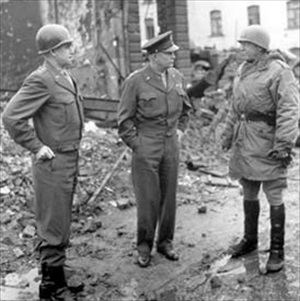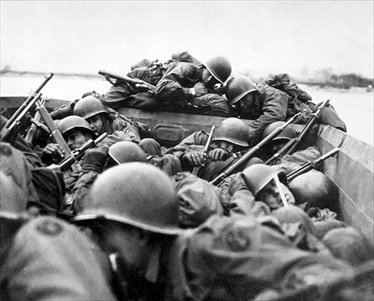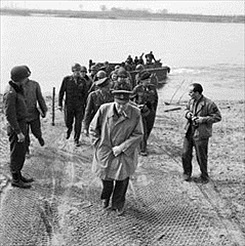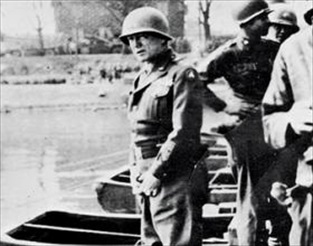PATTON’S THIRD ARMY CROSSES RHINE
Oppenheim, Germany • March 22, 1945
On this date in 1945, 1 day before the mixed British-Canadian 21st Army Group under Field Marshal Bernard Law Montgomery was due to launch Operation Plunder, the long-awaited northern offensive across the Rhine River at Rees and Wesel in North Rhine-Westphalia, Gen. George S. Patton, Jr., sneaked soldiers of the 5th Division of his Third U.S. Army across the Rhine at Oppenheim, lower on the river and south of Mainz. To Patton’s surprise and relief, the invaders were not opposed by enemy forces. Back in his underground command post in Berlin, Adolf Hitler urged the Wehrmacht (German armed forces) to attack the Allied bridgehead at Oppenheim, only to be told that no reserve forces were available to embark on such an operation.
For the Allied high command, the all-out assault across the Rhine was hugely important because crossing the river, the historic boundary of German power in the West, rang the death knell on the lunacy and bestiality of Hitler’s Thousand Year Reich. Even Hitler’s closest supporters like Heinrich Himmler and Joseph Goebbels could clearly hear the clanging bell. Though Gen. Patton had the blessing of U.S. Twelfth Army Group head Gen. Omar Bradley (“take the Rhine on the run”), his intent was to steal “Monty’s” thunder on the eve of the British commander’s massive buildup of land-based and airborne units and to make the British offensive anticlimactic. (To be fair to Montgomery’s 21st Army Group, their Rhine crossings were marshy (Wesel) and twice as wide, with the river carrying a far higher volume of water than the crossings consigned to the U.S. Third and Seventh Armies and the French First Army, meaning that Montgomery, with more than a million troops, could not possibly cross the Rhine “on the run.”)
Two days later, on March 24, Patton, showing his contempt for the enemy, made good on his pledge to “piss in the Rhine in a week,” which he did from a pontoon bridge in full view of his men and news cameras. Once back on terra firma, in emulation of William the Conqueror, his favorite historical figure, Patton reached down and claimed a handful of soil. Later in the day he sent a dispatch to Allied Supreme Commander Gen. Dwight D. Eisenhower: “I have just pissed into the Rhine River. For God’s sake send some gasoline.” Neither a patient nor defensive-minded commander, Patton seems not to have hindered his promotion to the temporary rank of 4‑star general in April by acting or remarking as he did. (Eisenhower praised the Third Army in a warm letter of appreciation to Patton on March 23.) The gasoline arrived and Patton’s men pressed headlong across Southern Germany, Austria, and into Czechoslovakia. Along the way the Third Army captured 300,000 enemy soldiers (this by the end of March) and liberated some of the most ghastly killing and concentration camps in the Reich: Ohrdruf (a subcamp of Buchenwald), Flossenbuerg, Dachau, and Mauthausen-Gusen.
George S. Patton’s Third U.S. Army Crosses the Rhine, March 1945
 |  |
Left: U.S. Army Generals Omar Bradley, Dwight D. Eisenhower, and George S. Patton. Bradley (1893–1981) took part in the buildup to the July 1944 Normandy landings (D-Day) and was given charge of the First U.S. Army. He engineered the Normandy breakout and was made commander of the Twelfth Army Group. It controlled the majority of American forces on the Western Front in 1944 and 1945: the First U.S. Army now under Gen. Courtney H. Hodges, the Third Army under Gen. George S. Patton, the Ninth Army under Gen. William H. Simpson, and the Fifteenth Army under Gen. Leonard T. Gerow. Eisenhower (1890–1969) was chosen in July 1942 to head Operation Torch, the Allied invasion of French North Africa in November 1943. In December he was appointed Supreme Commander of the Allied Expeditionary Force and planned the July 1944 invasion of Nazi-occupied Western Europe (Operation Overlord). After the war Eisenhower was appointed Military Governor of the U.S. Occupied Zone in Germany. Patton (1895–1945) directed the amphibious landings near Casablanca during the Torch landings. In 1943 he commanded the Seventh U.S. Army during the Sicilian campaign (Operation Husky), and in August 1944 his Third Army became operational in Northern France. The 60‑year-old Patton was fatally injured in a road accident in Baden-Wuerttemberg, Southwestern Germany, on December 9, 1945, dying 12 days later.
![]()
Right: Keeping a low profile, soldiers of the Third U.S. Army’s 89th Infantry Division cross the Rhine in motorized assault boats under intense German fire, March 24(?), 1945. Ashore in borrowed and captured trucks, the infantrymen festooned their vehicles with signs proclaiming “Next stop Berlin.”
 |  |
Left: British Prime Minister Winston Churchill, in the company of Field Marshal Bernard Montgomery and a party of U.S. commanders, crosses to the German-held east bank of the Rhine without incident, March 25, 1945, less than 2 days after the start of Operation Plunder.
![]()
Right: After ordering his engineers to construct a pontoon bridge over the German Rhine and sneaking a division onto the east bank on the night of March 22, Patton famously relieved himself from the bridge the next day—and made sure he was photographed doing so. “I’ve been looking forward to this for a long time,” he told the crowd. Three weeks earlier Churchill had visited the front lines near the thoroughly destroyed town of Juelich in what is today’s North Rhine-Westphalia. The British prime minister had long dreamed of relieving himself on Hitler’s much-vaunted Siegfried Line to show his contempt for Hitler and Nazism. Unlike Patton, Churchill forbade photographs of the occasion though not commentary. In the words of Alan Brooke, chief of the Imperial General Staff, the “Old Man” wore a “boyish grin of contentment” after his bathroom break. Many Allied units, beginning perhaps with the first American patrol to have crossed on to German soil on September 11, 1944, proclaimed their arrival on enemy territory by symbolically urinating on the ground.
Tribute to George S. Patton and Third U.S. Army
![]()

 History buffs, there is good news! The Daily Chronicles of World War II is now available as an ebook for $4.99 on Amazon.com. Containing a year’s worth of dated entries from this website, the ebook brings the story of this tumultuous era to life in a compelling, authoritative, and succinct manner. Featuring inventive navigation aids, the ebook enables readers to instantly move forward or backward by month and date to different dated entries. Simple and elegant! Click
History buffs, there is good news! The Daily Chronicles of World War II is now available as an ebook for $4.99 on Amazon.com. Containing a year’s worth of dated entries from this website, the ebook brings the story of this tumultuous era to life in a compelling, authoritative, and succinct manner. Featuring inventive navigation aids, the ebook enables readers to instantly move forward or backward by month and date to different dated entries. Simple and elegant! Click 











